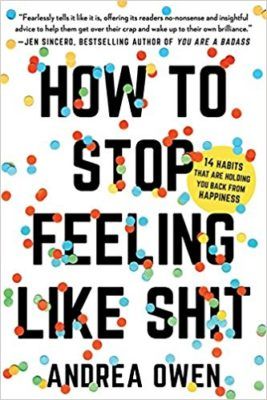4 Sneaky Ways You’re Sabotaging Your Own Happiness
Who among us hasn't spent time thinking: I'll finally be happy when I...meet my soulmate...make that career switch...hit that fitness goal...and on and on? But once you achieve said milestone, you quickly move onto the next thing, making it feel like joy is always one frustrating step ahead.

Andrea Owen, life coach and author of How to Stop Feeling Like Sh*t, is on a mission to flip that script, challenging women to confront the seriously common (yet surprisingly sneaky) habits that hold them back from being their most epic, complex selves right now, not at some point "when."
"I think that we have a rainbow of emotions that range from anxiety, to worry, to fear, to happiness, to trepidation, to grief," she says. "If we lean into all the emotions of our life, we end up landing back at happiness more often."
No, that's not necessarily the easiest thing to do. But doesn't it sound better than chasing happiness all the darn time?
Keep reading for 4 sneaky habits that are keeping happiness at bay.

1. You expect the worst outcome
Ever do something like spell a colleague's name wrong in an email then immediately become convinced they're going to be offended, you'll get fired, and (obvi) never work again? Owen classifies this reaction as "catastrophizing."

{{post.sponsorText}}
The problem (aside from insane stress levels, of course)? "Catastrophizers are so good at knowing the dark that they expect the dark," says Owen.
The fix: To snap out of that doom-and-gloom pattern, Owen suggests phoning a friend—or better yet, a handful of them—who will fluff up your ego. Ask them to send you a brief email describing what they love and admire about you. (And, duh, make sure to do the same for them.) It's hard to feel dark about the future when your BFFs are raving about how awesome you are.

2. You buy into your own imposter syndrome
"At its heart, the imposter syndrome refers to people who have a persistent belief in their lack of intelligence, skills, or competence," explains Owen. How do you know if you have it? Think about your language. Do you usually use words like "just," "only," or "lucky" when describing your achievements? If so, then yes, you've definitely got some imposter syndrome going on.
The fix: Force yourself to truly accept positive feedback, Owen says, which is definitely harder than it sounds. But say you're on the job and someone pays you a compliment. Instead of rushing to point out all of the mistakes you made along the way or attributing your success to a co-worker, pause, collect your thoughts, and respond in a way that honors your hard work. After a while, that becomes the habit instead of always downplaying your awesomeness.

3. You're constantly comparing yourself to social media standards
While perusing Instagram on your lunch break, you see that one friend just crushed a marathon and another is off on some awesome adventure—while you're sitting in your cubicle and wondering how you're going to pay your rent. These days, it's harder than ever not to fall into that trap of comparing your life to a a heavily-curated version of someone else's.
The fix: Create a list of all your wins. They can be as simple as "I finally nailed by headstand!" or as fundamentally life-changing as "I built my business from the ground up." Then take a few minutes to admire your handiwork—like, at least as much time as you'd spend drooling over other people's Instagram feeds. Because, guess what? You did all this.

4. You're afraid of feeling vulnerable
Women have been criticized for being too sensitive for so long that many of us have learned to put up a tough exterior. But it can go too far, Owen says. "When people tell people to be strong, what we're really saying is: Don't fall apart, don't cry too much, don't crumble, don't go too far 'over there' where we—the audience of your pain—will be uncomfortable," she explains.
The fix: Think about something in your life that upset you, then give yourself permission to really, fully feel that emotion for a bit. Owen even gave one of her clients, who had lingering rage towards her father, the assignment to smash things up. Doing so helped her release the pent-up anger that had been living inside her for far too long. And the next time someone tells you to "stop being so emotional," just smile kindly and head off to boxing class or lean way in to a good, cathartic cry.
Speaking of loving yourself, here's one simple hack you can do daily. And here's what self-love looks like according to 11 wellness pros.
SaveSaveSaveSaveSaveSaveSaveSaveSaveSaveSaveSaveSaveSaveSaveSave
SaveSave
SaveSave
SaveSave
SaveSave
SaveSaveSaveSaveSaveSaveSaveSaveSaveSaveSaveSaveSaveSaveSaveSave
SaveSave
Loading More Posts...